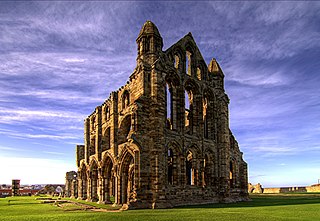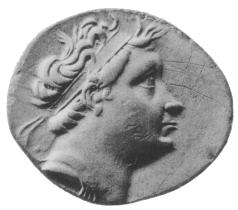The Book of Kings is a book in the Hebrew Bible, found as two books in the Old Testament of the Christian Bible. It concludes the Deuteronomistic history, a history of Israel also including the books of Joshua, Judges, and Samuel.

The 7th century BC began the first day of 700 BC and ended the last day of 601 BC.

Year 664 (DCLXIV) was a leap year starting on Monday of the Julian calendar. The denomination 664 for this year has been used since the early medieval period, when the Anno Domini calendar era became the prevalent method in Europe for naming years.

Nicomedes II Epiphanes was the king of Bithynia from 149 to c. 127 BC. He was fourth in descent from Nicomedes I. Nicomedes II was the son and successor of Prusias II and Apame IV. His parents were related as they were maternal cousins.
Oswiu, also known as Oswy or Oswig, was King of Bernicia from 642 and of Northumbria from 654 until his death. He is notable for his role at the Synod of Whitby in 664, which ultimately brought the church in Northumbria into conformity with the wider Catholic Church.

Chlothar III was King of the Franks, ruling in Neustria and Burgundy from 657 to his death. He also briefly ruled Austrasia.
Ecgfrith was the King of Deira from 664 until 670, and then King of Northumbria from 670 until his death in 685. He ruled over Northumbria when it was at the height of its power, but his reign ended with a disastrous defeat at the Battle of Nechtansmere against the Picts of Fortriu in which he lost his life.

Wulfhere or Wulfar was King of Mercia from 658 until 675 AD. He was the first Christian king of all of Mercia, though it is not known when or how he converted from Anglo-Saxon paganism. His accession marked the end of Oswiu of Northumbria's overlordship of southern England, and Wulfhere extended his influence over much of that region. His campaigns against the West Saxons led to Mercian control of much of the Thames valley. He conquered the Isle of Wight and the Meon valley and gave them to King Æthelwealh of the South Saxons. He also had influence in Surrey, Essex, and Kent. He married Eormenhild, the daughter of King Eorcenberht of Kent.

Taharqa, also spelled Taharka or Taharqo, was a pharaoh of the Twenty-fifth Dynasty of Egypt and qore (king) of the Kingdom of Kush from 690 to 664 BC. He was one of the "Black Pharaohs" who ruled over Egypt for nearly a century.

Elymas, also known as Bar-Jesus, is a Jew described in the Acts of the Apostles, chapter 13, in the New Testament. He is referred to as a mágos, which the King James Bible translates as "sorcerer".
Sexred, or Sexræd, and Sæward are two brothers who jointly served as king of the East Saxons after the death of their father Sæbert.

Sæbbi was son of Sexred and was the joint King of Essex from 664 to about 683 along with his cousin, Sighere. After Sighere died, Sæbbi became sole ruler of Essex until 694.
Ealdwulf, also known as Aldulf or Adulf, was king of East Anglia from c. 664 to 713. He was the son of Hereswitha, a Northumbrian princess, and of Æthilric, whose brothers all ruled East Anglia during the 7th century. Ealdwulf recalled that when he was very young, he saw the Christian/pagan temple belonging to his ancestor Rædwald.

Æthelburh, known as Ethelburga, was an Anglo-Saxon princess, abbess and saint.
Alhfrith or Ealhfrith was King of Deira under his father Oswiu, King of Bernicia, from 655 until sometime after 664. Appointed by Oswiu as a subordinate ruler, Alhfrith apparently clashed with his father over religious policy, which came to a head at the Synod of Whitby in 664. After this, Alhfrith disappears from the historical record.

Eni or Ennius was a member of the Wuffing family, the ruling dynasty of the kingdom of East Anglia. He was the son of the semi-historical pagan king Tyttla and the brother of Rædwald, who both ruled East Anglia.
Æthelwold, also known as Æthelwald or Æþelwald, was a 7th-century king of East Anglia, the long-lived Anglo-Saxon kingdom which today includes the English counties of Norfolk and Suffolk. He was a member of the Wuffingas dynasty, which ruled East Anglia from their regio at Rendlesham. The two Anglo-Saxon cemeteries at Sutton Hoo, the monastery at Iken, the East Anglian see at Dommoc and the emerging port of Ipswich were all in the vicinity of Rendlesham.
Dappula I was King of Anuradhapura in the 7th century, whose reign lasted from 661 to 664. He succeeded Kassapa II as King of Anuradhapura and was succeeded by Dathopa Tissa II.
Dathopa Tissa II was King of Anuradhapura in the 7th century, whose reign lasted from 664 to 673. He succeeded his brother Dappula I as King of Anuradhapura and was succeeded by Aggabodhi IV.
Urtak or Urtaku was a king of the ancient kingdom of Elam, which was to the southeast of ancient Babylonia. He ruled from 675 to 664 BCE, his reign overlapping those of the Assyrian kings Esarhaddon (681-669) and Ashurbanipal (668-627).









